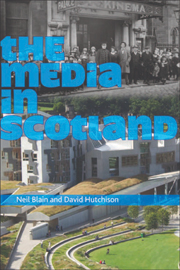Book contents
- Frontmatter
- Contents
- Preface
- Framing the Discussion
- The Historical Context
- Screen and Sound
- 7 Three Ring Circus: Television Drama about, by and for Scotland
- 8 ‘Nae Bevvying, Nae Skiving’: Language and Community in the Scottish Soap Opera
- 9 Broadcast Comedy
- 10 Contemporary Scottish Cinema
- 11 Radio and Popular Music
- Themes and Futures
- Select Bibliography
- Notes on Contributors
- Index
9 - Broadcast Comedy
from Screen and Sound
Published online by Cambridge University Press: 05 August 2013
- Frontmatter
- Contents
- Preface
- Framing the Discussion
- The Historical Context
- Screen and Sound
- 7 Three Ring Circus: Television Drama about, by and for Scotland
- 8 ‘Nae Bevvying, Nae Skiving’: Language and Community in the Scottish Soap Opera
- 9 Broadcast Comedy
- 10 Contemporary Scottish Cinema
- 11 Radio and Popular Music
- Themes and Futures
- Select Bibliography
- Notes on Contributors
- Index
Summary
Despite being a very small country, Scotland has produced, in Harry Lauder and Billy Connolly, two of the best, internationally known comedians of the twentieth century. Both Lauder (1870—1950) and Connolly (1942—), made significant, if very different, contributions to comedy broadcasting in this country. It is, therefore, important to acknowledge that the discourses of Lauder and Connolly have played a crucial part in other people's perceptions of Scotland.
There were significant variations in the substance and narratives of Lauder and Connolly — when Lauder died in 1950 the swear word ‘fuck’ which is employed throughout Connolly's act was not acceptable on stage anywhere in the UK, let alone on the airwaves, and would not be for decades to come. Lauder was ‘couthy’ by comparison with Connolly and his popular jokes about Scottish stinginess played very much second fiddle to his songs, although he was not averse to stopping a song like I love a Lassie two-thirds of the way through to play a comic turn about losing an engagement ring (Attic Archives, The Great Entertainers, BBC: 1985). Connolly's superb monologues examining the ludicrous minutiae of everyday life or dissecting the small-ads columns in newspapers are far more important than his music. There is also a difference in the way their audiences received the two performers. Yet there are similarities in their careers. Like many entertainers, both had difficult, unhappy childhoods.
- Type
- Chapter
- Information
- The Media in Scotland , pp. 137 - 150Publisher: Edinburgh University PressPrint publication year: 2008

